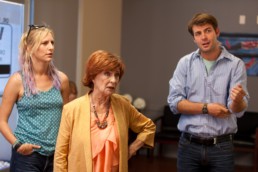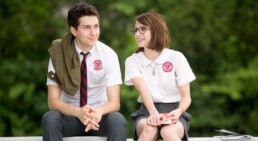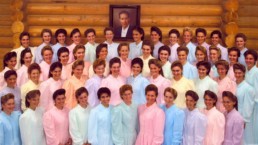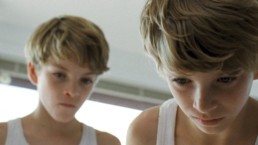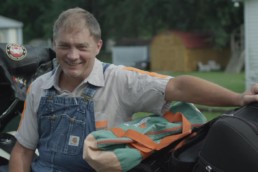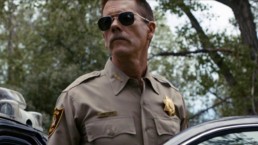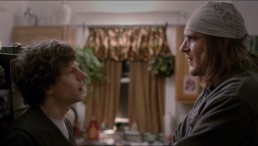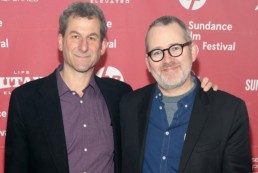Review: 'This is Happening'
It is always a delight to see 89-year-old Cloris Leachman on screen, whether she's getting down on "Dancing with the Stars" or hearing her iconic voice in the animated film The Croods. We know her as a quick-witted woman with sass, and we love her for it. It's no surprise then that Leachman shines as the ailing but feisty grandmother in the comedy This is Happening, a heartfelt story about two estranged siblings setting aside their differences in order to find their runaway grandma.
Per his father's instructions, straight-laced Philip Davis (James Wolk) is instructed to place his grandmother Estelle (Leachman) in an assisted living facility. Not wanting to disappoint his father, Philip obligatorily prepares for a solo trip to his grandma's house in Palm Springs, leaving behind a mediocre job and a bossy girlfriend for a week. When his drug dealer/slacker sister Megan (Mickey Sumner) hears of Philip's trip, she sees it as an opportunity to pick up a large supply of marijuana from her dealer, so she convinces Philip to let her tag along.
If anything, Cloris Leachman is the film's saving grace, and could be reason enough to watch the film.
When they find Estelle at her home, they are taken aback by her eccentricity. Her taxidermied dog Ralph rests atop the television set while Estelle's copper wig lays perfectly styled on top of her head. It isn't until Estelle and Megan smoke some pot when Megan lets it slip that the only reason why her and her brother are there is to put her in a retirement home. Not one for confined living, Estelle grabs the stuffed dog and takes off in the middle of the night for Seattle. As if the stakes of a missing grandma wasn't high enough, Megan reveals to Philip that she left a 5 lb bag of marijuana in the trunk of the car that Estelle took.
At its core, This is Happening is a very silly, over the top film that could have greatly benefitted from the "less is more" approach. Having Philip and Megan be two polar opposites that ultimately come together for the greater good is a theme that has done before, but it is the way in which the characters push each other's buttons that is tiring to watch. Some of the bizarre situations they find themselves in, like breaking out of hospitals and stealing convenience food from small town gas stations, could have been genuinely funny if the scenes were played more realistically and less soap opera-y. The acting seemed as if it was for the stage, in which case over exaggeration is encouraged. In films, however, over exaggeration is obnoxious. Unfortunately, the characters of Philip and Megan are so "by the book" and stereotypical that we can predict the upcoming jokes in the scenes and sigh from the lack of authenticity that makes either character sympathetic.
This is Happening seems targeted to millennials, and could do well among the VOD audience. If anything, Cloris Leachman is the film's saving grace, and could be reason enough to watch the film. Her performance is reminiscent of June Squibb in Nebraska, to give an even better idea. Director Ryan Jaffe may not have hit a home run with this film, but seeing as this is his feature film directorial debut, I have high hopes that his breakout film will be forthcoming.
This is Happening opens this Friday at the Laemmle Ahrya Fine Arts Movie Theatre in Beverly Hills.
https://www.youtube.com/watch?v=dprsVsILp2M&feature=youtu.be
Review: 'Ashby'
Nat Wolff takes the lead as another "teenage heartthrob" (see: Paper Towns, The Fault in Our Stars) in the latest coming of age film Ashby. Doing what he's proven he does best, Wolff takes the "boy likes girl, boy loses girl, boy gets girl" situation to pleasurable, although not groundbreaking, heights. Director Tony McNamara, known for his extensive TV experience, tries his hand at the long form narrative but can't shake the "made for TV" vibe throughout. While a pleasing attempt at a feature debut, it's hard to imagine Ashby will have too much staying power past its theatrical release.
Wolff plays Ed Wallis, the new kid who recently transferred into an Oregon high school. His extensive knowledge of Ernest Hemingway in the film's first scene is unexpected, yet very engaging. Perhaps this is not just another teen rom-com after all? Ed describes Hemingway's life as a daily struggle. A man who believed that in order to prove his manhood, one must try to get killed and overcome it. Not a discreet enough reference to render it pointless, we assume he must be foreshadowing the film's titular character Ashby, played by Mickey Rourke.
Despite Ashby's inherent "teen drama" formula, the juggling of storylines and non-fluid editing makes me think that this movie would have been better served as a television series rather than feature film...
Ed meets Ashby when he is assigned to write a 2,000-word paper on an "old person," and turns to his kooky next-door neighbor. Clearly not the 'former napkin and straw salesman' he claims to be, Ed knows there is much more to Ashby than he is letting on. After finding a stack of passports (which I'm pretty sure were old pictures of Rourke from Google images), guns, and knives littered throughout his house, Ashby confesses to being a hired assassin. Their relationship grows throughout the course of the film and they find each needing the other one more than either of them could have imagined.
The film's biggest con is having three parallel story lines which all center around Ed, making for one watered down film. The first is Ed's coming of age learning experiences with his next door neighbor. The second is some minor teenage angst in dealing with a strained relationship with his absentee father (he lives with his mother played by Sarah Silverman). The third is a high school romance with the nerdiest girl in school, Eloise (Emma Roberts). Their relationship is put to the test when Ed joins the football team and must decide where his priorities lie.
Roberts, who shares the screen with Wolff in Gia Coppola's Palo Alto, effortlessly captures your attention onscreen, but can't shake the screenwriter's stereotypical, one-dimensional character that Eloise was written as.
It is so good to see Mickey Rourke on the big screen, even if his talents aren't being utilized to their fullest here. His masculine yet compassionate and comedic performance hits every note just right and leaves us wanting more. Despite Ashby's inherent "teen drama" formula, the juggling of storylines and the seemingly unintentional off-kilter editing, makes me think that this movie would have been better served as a television series rather than feature film, but it is enjoyable nonetheless.
Ashby is in select theaters, on Demand and digital HD September 25th.
https://www.youtube.com/watch?v=z6NyqgsFwz0
Review: 'Prophet's Prey'
In the early 1800s, a man named Joseph Smith claimed he had been chosen by God to restore the Church of Jesus Christ on earth. For the next ten years, he was said to have received "messages" from above which eventually were translated into the Book of Mormon. Among the messages was the instruction that Mormon men were to have at least three wives to reach the celestial kingdom. Multiple wives bearing many children, known as polygamy, was seen as one of the most important components of the holy doctrine, and was the belief of the self-proclaimed "prophet" Warren Jeffs when he took control of the FLDS (Fundamentalist Church of Latter Day Saints) church and its people in 2002.
Prophet's Prey trails closely behind private investigator Sam Brower who has dedicated years to monitoring the religious cult, sometimes from a distance and sometimes not. In the film, Brower is confronted, chased and followed by FLDS security in an attempt to expose the group's deepest and darkest secrets. What results is a riveting documentary, an unintentional horror film that exposes what truly goes on behind the doors of one of the world's most evasive religious sects.
Animated sketches recreate the FLDS history, giving those who are less familiar with the religion and its teachings an opportunity to get caught up to speed within the film's first three minutes.
However what looks like paradise from above is in fact a mirage; one step into the reality of this scene and into the day to day life of a Warren Jeffs' follower reveals a world void of joy, happiness, and individuality.
Director Amy Berg captures the innocence and remorse of so many current ex-members and how they feel about the life they lost while brainwashed at the hands of Warren Jeffs' tyrannical mind control. Warren's brother Wallace speaks candidly to Berg, expressing the emotional devastation at the loss of his children who, still complying to FLDS rules, remain hateful towards him and want no form of a relationship. One of Warren's wives, Janetta Jessop (#63 for those keeping score at home) tells stories of underage marriage, bearing a child, and an irreparable relationship with her own mother.
It is ironic that Berg pairs beautiful sweeping aerial shots of the FLDS' mountainous compound with the full sound of a children's choir singing hymns. These moments could be taken from a fairy tale, an innocent scene born out of purity. However what looks like paradise from above is in fact a mirage; one step into the reality of this scene and into the day to day life of a Warren Jeff's follower reveals a world void of joy, happiness, and individuality.
Dustin Lance Black, Brian Grazer, Ron Howard, and Regina Scully are a few of the powerful forces that serve as executive producers, while music by Warren Ellis and Nick Cave round out this who's who of famous backers.
At one time being #2 on the FBI's most wanted list (next to Osama Bin Laden and Whitey Bulger), Warren Jeffs was captured in 2006. Today, Warren's brother Lyle rules over more than 10,000 FLDS followers on behalf of his brother, who still remains locked up in a Texas jailhouse. Despite his capture, the worry of Warren Jeffs' control over his followers has not stopped. Interviewees are concerned that blind obedience will see thousands of people follow Warren to the grave, reminiscent of a Waco or Jonestown. Even though he is behind bars, Prophet's Prey leaves us with the indication that Warren's reign is not over yet.
Prophet's Prey opens Friday, September 25th at the ArcLight Hollywood followed by a national rollout.
https://www.youtube.com/watch?v=PWUP9IYjfgI
Review: 'Goodnight Mommy'
Equal parts cerebral and graphic, Goodnight Mommy (Ich Seh, Ich Seh) is an immediate cult favorite from Austrian filmmakers Severin Fiala & Veronika Franz. A contemporary setting with a mid-century modern aesthetic, the overall tone of the film is quiet, daring its audience to listen and watch more closely. With their glowing skin and bright blue eyes, the characters seem angelic and inviting, yet be prepared for this seemingly warm cinematic experience to throughly turn your world upside down and possibly leave you with nightmares. You've been warned.
Twins Elias and Lukas (Elias Schwarz, Lukas Schwarz), nine year-old boys who find each other's presence company enough, are awaiting their mother's return from facial reconstructive surgery in the early scenes of the film. Bandaged and unrecognizable, she (Susanne Wuest) returns home and immediately something seems off to the boys. This is not the mother they knew.
Together, the boys make a pact that they will get her to crack, and the torturous ways in which they go about getting their information is almost unbearable to watch.
Small incidents since their mother's return only further proves to the boys that the bandaged woman is impostor. She favors one son more than the other, vocalizes her frustrations with the twin's relationship as if wanting to break them up, and more significantly, is missing her signature mole on the right side of her face. Together, the boys make a pact that they will get her to crack, and the torturous ways in which they go about getting their information is almost unbearable to watch.
There are some stereotypical thriller tropes that are sprinkled throughout the film; for example, you know it's a scary movie when the family doesn't have neighbors and live in a remote, yet beautiful, wooded oasis. A couple jump scares here and dream sequences there, this art film didn't necessarily need to stoop to that level to achieve those "scary" moments.
Goodnight Mommy works because it is a very tight, solid film. There are three principal actors, one main location, and minimal dialogue. The horror builds from the twin boys' insecurities, which is perfectly conveyed by novice actors Elias and Lukas, who make their cinematic debut here. Their innocence is perfectly guided too, making it hard for the audience to confidently decide on who to sympathize with. It is a welcoming but unsettling feeling, is this really their mother? And if so, is she an innocent victim? Are the boys just misunderstood or are they terrorists? Being a genre film, we tend to throw guesses at every possible twist very early on, but keeping an open mind and enjoying the ride will give you the best experience.
Goodnight Mommy opens at Cinefamily this Friday.
https://www.youtube.com/watch?v=0kXpUaQpXMA
In 'Finders Keepers,' One Man's Foot is Another Man's Treasure
In 2007, a North Carolina man got a lot more than he bargained for when he bid on a used grill from a repossessed storage unit at a local flea market. Much to his surprise, when Shannon Whisnant took the grill home, he discovered a severed human foot inside. An egotistical and boisterous personality, he unapologetically intended to keep this foot forever, despite demands of its return from the man whose foot it was. As bizarre as it sounds, this all happens within the first act of the film Finders Keepers, truly one of the strangest and funniest documentaries of the year.
While most people who discover an amputated body part would either alert authorities or get rid of it as quickly as possible, Shannon found this as an opportunity to cash in on 15 minutes of fame. Assuming that this severed foot would be an easy moneymaking spectacle, he charged $1 for children and $3 for adults to take a peek at just the grill the foot came in. He was making a name for himself as a ruthless media hog, and much to the dismay of his family, Shannon thought this was his big break. He always wanted to be “famous”. However, when John Wood caught word that Shannon had the foot, his foot, he publicly demanded it back. What happens next is a ridiculous media frenzy, a fantastic chain of events that ultimately leads to a custody battle over the foot on the Judge Mathis TV show.
It’s an unconventional idea, but the way John speaks to the camera and explains his hardships so honestly and, now seven years sober, so openly, we can’t help but support his decisions, no matter how crazy they may be.
Just how did the foot get in the grill in the first place? This is the question asked by so many throughout the course of this bizarre, true-life tale. Unfortunately, the story is born out of tragedy– John lost his foot in an airplane crash that also left his father dead. On top of struggling with drugs and alcohol for years, the death of his dad was especially hard on him, so he decided to mummify his foot in memoriam. It’s an unconventional idea, but the way John speaks to the camera and explains his hardships so honestly and, now seven years sober, so openly, we can’t help but support his decisions, no matter how crazy they may be.
Directors Bryan Carberry and Clay Tweel have really found a needle in a haystack with Finders Keepers. While it is tonally a funny film, they don’t shy away from hitting poignant, emotional notes that ground the film and give it substance. While it could have been easy to laugh at and look down on the situation, the way Carberry and Tweel capture John’s essence and Shannon’s ignorance is sweet; we laugh not at them, but with them.
I first saw Finders Keepers when it screened during this summer’s Sundance Next Fest and while I initially didn’t have high expectations that this documentary would be anything out of the ordinary, I did predict that I would be in for a wild ride. Now having seen the film, the term “wild ride” seems like an understatement. Funnily enough, when I left the theater at the Ace Hotel in Downtown L.A., I ran into John and his wife about a block away. I stopped to talk to him for a good 20 minutes, and he told me even more outrageous facts that will possibly be made into a narrative film. You heard it here first.
Finders Keepers opens in Los Angeles this Friday, September 25th; VOD October 2nd.
https://www.youtube.com/watch?v=bexyqstg4-E
Review: 'Cop Car'
Kicking off this year's NEXT FEST (the LA-set sister film festival to Sundance), Cop Car is being touted as a must-see for "midnight thriller" cinephiles. A corrupt cop, two rebellious kids, and a stolen police vehicle make up this dark little comedy that proves to be one of summer's top coming-of-age thrillers. Premiering this past Sunday at the Hollywood Forever Cemetery (a fitting location for added creepiness), the tense cinematic sequences that Cop Car organically conjures up were felt long after the film's brisk 86 minute run time.
Kevin Bacon, who stars in the set-up opposite the film's two young leads, shows off his devilish comedic chops as the mustachioed and corrupt county sheriff, Kretzer. Bacon doesn't appear in the film's initial scenes, a job left to newcomers James Freedson-Jackson and Hays Wellford, who play young runaways and best friends Travis and Harrison. The boys, moseying through the picturesque Colorado plains while one-upping each other in an innocent-enough swear-off as they look for more adventure, find just that in an abandoned cop car in the middle of nowhere. With an empty beer bottle on the roof and the keys in between the seats, the boys take off on a joyride that every young kid dreams of.
Perhaps that's just the power of Kevin Bacon, but I'd like to think it comes from the undeniable magic that happens when a talented actor is matched with an as equally talented and creative director like the promising Watts.
Donuts, burnouts, and speeding make for a very entertaining montage sequence, but it's not until the owner of the car comes back to claim it (shown in a brief flashback to the moment said driver leaves the car), and realizes it's missing, when the tension (and comedy) hits. The car belongs to Sheriff Kretzer, and, past his comedic confusion, he is not happy. After some illegal activity leads him away from the car in the first place, he is left immobile and alone in the vast countryside, and determined to get his car back (as the trunk is learned to be holding precious cargo) quickly and in one piece – a fate he doesn't hold for the rest of the parties involved.
Cop Car is a reflection of a successfully made, true independent film. With its limited budget, seen in its rural-set locations and single-day narrative, director Jon Watts manages to produce something small and wonderful. It's no wonder why Watts was chosen to direct the forthcoming Spiderman reboot. This small scale production produces high stakes horror, and while Watts sets us up with the perfect scenario and tone reminiscent of the Coen Brothers' No Country For Old Men, it is the actors that truly drive the story home. Kevin Bacon is selfish, evil, and lacks empathy, yet I still found myself rooting for him. Perhaps that's just the power of Kevin Bacon, but I'd like to think it comes from the undeniable magic that happens when a talented actor is matched with an as equally talented and creative director like the promising Watts.
For some, however, this tightly wrapped story may leave some important questions unanswered after the film cuts to black. Why were the kids running away in the first place? What ultimately happened to Sheriff Kretzer? Did the boys make it out ok? I don't believe these facts are detriment to the film's success; in fact, it makes for a perfect setup for Cop Car 2. Now that's one sequel I'd like to see.
Cop Car opens at the ArcLight Hollywood this Friday.
https://www.youtube.com/watch?v=MBK_9GlVlc0
Review: 'The End of The Tour'
Often times, when an iconic figure in history, and specifically pop culture, is recreated for the purpose of film, we can't help but have preconceived notions of the subject, who will either live up to our standards, or be a flimsy caricature of said person. While I had heard of author David Foster Wallace before reviewing The End of the Tour, I was not as familiar with him as were the other attendees at the film's screening, where I soon realized that I was sitting amongst a crowd of literary conscious NPR members. The early and scattered premature uncertainty of Jason Segel's performance as the beloved D.F.W. didn't go unheard by me, and yet any question or doubt this room had going into the film was answered by the end. Not only is Segel mesmerizing, The End of the Tour stands as an early contender for a Best Picture Oscar nomination.
The End of the Tour is based on real-life journalist David Lipsky's critically acclaimed memoir, Although Of Course You End Up Becoming Yourself: A Road Trip with David Foster Wallace, which chronicles the highs and lows of his 1996 five day journey with his interviewee-author. Jesse Eisenberg plays Lipsky, himself a novelist with a fasciation with Wallace. While working as a reporter for Rolling Stone magazine, Lipsky convinces his boss to let him join Wallace on the last leg of his book tour for the post-modern masterwork, Infinite Jest, scoring a days-long exclusive with the writer dubbed genius.
Lipsky, a fast-talking and socially awkward man, first meets the reserved, introspective Wallace at his home. Subtle humor is sprinkled throughout this first "getting to know you" scene, and it's here where the tone is set for the rest of the film. As the days go by, the bond grows stronger between Lipsky and Wallace, and what was initially a more formal and awkward Q&A evolves into a free flowing and revealing, conversational interview.
A neatly wrapped package with stand out performances, this is an example of what really good filmmaking looks and, more importantly, feels like.
Inevitably, as a journalist who also happens to be a fan, Lipsky gets too close to his mesmerizing subject to stay objective. Yet the breaking of this ethical code is what it takes for Wallace's emotional walls to come down, as he begins to bare his soul to a man he just met. Pretty soon, we, as well as the characters on screen, step back and ask ourselves, who is interviewing who?
It is easy to chart where Wallace's-depicted personality breaks through and wins us over. The thoughtful dialogue between both characters is sharp and tactful, one of my favorite lines being "reading you is another way of meeting you," but the minutes-long monologues are where Segel really shines. His honesty and disenchantment with fame is a refreshing perspective on life, and his humility is applaud-worthy. He observes that American life has us programmed to want to achieve everything, but there is nothing wrong with ultimately wanting to stray from the mainstream and be left alone. This is the inspiring path Wallace is choosing to take, but can't help but let his "Lone Wolf" lifestyle, depression, and loneliness get the best of him.
Segel and Eisenberg's performances are magnetically matched, the intensity of their relationship growing stronger throughout the film. Much credit is due to screenwriter Donald Margulies, who himself is a Pulitzer-Prize winning writer. He tackles The End of the Tour with stark realism, highbrow humor, and bittersweet insight. This is evident in the film's final moments, which ends with a single, affecting word.
Director James Ponsoldt's big break into mainstream cinema came in 2013 with the coming-of-age film, The Spectacular Now. Avoiding many of the stereotypical pitfalls most young-adult stories fall victim to, Ponsoldt captured sensitivity and poignancy that left a lasting impression on audiences. The Miles Teller-Shailene Woodley starring film paved the way for this next feature, and it is with this same attention to detail and wistfulness that The End of the Tour is greeted.
Meditative and thought provoking, The End of the Tour captures the complexity of one man's life through a delicate lens. A neatly wrapped package with stand-out performances, this is an example of what finely-crafted filmmaking looks and, more importantly, feels like. One thing to note–there is a hidden gem if you stay through the end of the film that delights, just like how I'd imagine David reacting to this surprise if the film was to continue on. It will bring a smile to your face and lead you to tip your hat to the creativity and talent of Ponsoldt in insightfully capturing the essence of a brief yet honest, and almost magical, moment in this reclusive genius' life.
The End of the Tour opens at the ArcLight Hollywood and Landmark Theaters this Friday.
https://www.youtube.com/watch?v=fqUa5sYHC9s
Morgan Neville & Robert Gordon on 'Best of Enemies'
In 1968, ABC News featured two high-profile intellectuals of different political parties, Gore Vidal, and William F. Buckley, Jr., to participate in 10 live debates with each other. What resulted created a new format for pundit television. The documentary Best of Enemies tells this incredible story, and I had the opportunity to talk exclusively with directors Morgan Neville and Robert Gordon about their unusual approach to making this film, the incredible Sundance screening, and how Kelsey Grammer and John Lithgow's "rare, mid-Atlantic accents" blew them away. We begin:
You both have successful musical backgrounds within filmmaking, were you hesitant to approach a "political" film?
MN: I feel like this film is about culture, and my culture films are about politics. A film like 20 Feet From Stardom talks a lot about race, civil rights, and gender. I don't see these things as being so distinct. To me, I find a great story and that's what excites me.
RG: I would say that our music films only use music as an angle into other, bigger topics– social and cultural topics. I understand why people think of this as a departure, but it wasn't intimidating in that way.
For our review of Best of Enemies, click here.
I have to say, I thought the music in the film was great. A mix of piano, some jazz, it is a pretty intense soundtrack.
RG: We wanted the music to reflect these two men, and they were both classical aficionados, so that was the starting point.
MN: Our big challenge in terms of the filmmaking was that we were making a film about two guys sitting in a room talking, how do you make that cinematic? I felt like we had to use every tool we could to make it feel big, and music is a major part of that. We felt the drama of what was going on in the conversations was operatic and the music had to match that level of drama.
What initially attracted you to this story and these people?
RG: It was the sense of the culture wars we live in being anticipated and expressed by these two guys so long ago.
MN: I just thought it was so... verbal. Haha. I just loved the language, the humor– that was the first thing that got to me. Without understanding where exactly this film would go, I was interested in all of the directions it could go.

Robert, you initially found the footage?
RG: Yeah, a friend of mine shared it with me and I was just wrapped up in it. I called Morgan and he was excited just by the notion of it. We both knew who these people were, we were raised at a time where they were part of the culture, but these debates had kind of slipped from our consciousness. All I had to do with Morgan was say their names and he was excited.
Did you have to narrow down a lot of footage?
RG: Oh yeah, there are 2 1/2 hours of raw debate footage, 10 meetings of 15 minutes each of them in verbal bloodsport.
MN: We had to [cut out a lot] because we didn't know where the story was going. Nobody had ever written a book about it. The only way we could figure it out was to just keep talking to people, and that's challenging, but the fun part too. Another big revelation for us was the ABC story, we didn't know the behind the scenes stuff. That was one of the things that just got better and better the more we went into it.
Yeah, like the roof literally caving in. You can't write that, it's too perfect.
MN: I know!
RG: Metaphorical for the network.
I read that you interviewed Gore Vidal in 2010, how long has the span of this project been?
MN: That was the beginning.
RG: Yeah, it began in May 2010. The first round of interviews were kind of a test for the movie. We both knew it was a good idea, but was it going to be affirmed by others? The people who said yes were a way of letting us know we were on the right path.

How did you choose John Lithgow nd Kelsey Grammer to read the voiceovers?
MN: It was a long thought process for us to figure out what to do. It was something we wrestled with, do we do soundalikes? Women? Children? Who reads these voices? And then, I don't actually remember how, but Kelsey Grammer is a known conservative and that kind of seemed like a natural fit. John Lithgow is a known liberal. They both have those rare, mid-Atlantic accents that completely embody Vidal and Buckley. That's one of those things you don't really know how it's gonna turn out until they do it, and they just blew us away. They brought so much to it.
Their voices sounded familiar, but they weren't distracting away from the film.
RG: They had the authoritative tone. Those Esquire articles [in the film] contained so much great interior monologue that we knew we had to get them in there.
When you approached them with this movie, were they familiar with the debates?
MN: They knew the men, John knew Gore and Kelsey knew Buckley. Neither of them knew them well. Most young people in 1968 were not home watching TV and because there were no VHS tapes or YouTube, it was something more of lore more than what people actually remembered.

What was your first thought after getting accepted into Sundance?
MN: Yay!
RG: Time to buy some galoshes!
Laughter
MN: This was a five year labor of love and whenever you do something like that, you always wonder if anybody is going to like it. Especially when you work on it in a small, dark room for years. Knowing we got into Sundance was huge, but the first screening at Sundance was probably the pinnacle moment of this whole ride. It was the first time we had proof that what we thought was working, actually was working. The laughter and conversation afterwards exceeded our expectations.
RG: I gotta say, in terms of a Sundance moment, the acceptance was great, but in that first screening in front of 500 people when we had only ever showed it to like 5 or 10 people at once, and never the finished cut to anybody, it was hitting me in my very core. There was a sense of elevation; this is working, the audience is laughing at everything they're supposed to laugh at. Even the small stuff! It's sort of like an alchemy moment, we've turned this thing and these ideas into something tangible.

